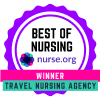What the Monkeypox Crisis Means for TNAA Healthcare Travelers
Monkeypox cases continue to rise in the U.S., meaning more healthcare workers face potential exposure to the disease. As your agency, we want to keep TNAA travelers informed on what to do if exposed to an infected patient.
First, it’s imperative to understand how the disease spreads. The Centers for Disease Control and Prevention (CDC) says the orthopoxvirus that leads to monkeypox can be transmitted by:
- contact with an infected person’s rash, scabs, or bodily fluids
- contact with objects, such as linens and clothing, and surfaces used by an infected person
- respiratory secretions during periods of close contact
- mother to fetus during pregnancy
- infected animals if you’re bitten or scratched by one.
The CDC says you can take safety precautions by washing your hands and wearing appropriate PPE, including gloves, a gown, eye protection, and a NIOSH-approved particulate respirator equipped with N95 filters or higher.
Here’s What To Know as a TNAA Traveler
The first way you should prep yourself is to be familiar with the facility’s policies and protocols, which are often sent to you via email before your assignment begins. If you have any questions about these policies, reach out to TNAA so we can get clarifications promptly. As your agency and employer, TNAA will administer any workers’ compensation (WC) benefits.
If you were exposed to monkeypox while caring for an infected patient, here’s a step-by-step of what you need to do.
- Step 1: Immediately notify your facility supervisor and TNAA.
- Your supervisor will follow facility protocol and advise you of any additional actions needed. The facility may ask you to notify infection control and/or occupational health. Ensure you inform them that you are a traveler and have contacted your agency to file a WC report.
- TNAA is here to help you understand your available benefits, connect you with additional resources you might need, and guide you through the process of filing a WC report. If you have questions about how to report information for a WC report, please ask your TNAA recruiter or your benefits specialist.
- Step 2: Health experts say to monitor for symptoms for 21 days following your last exposure. According to the CDC, at the time this article was published, asymptomatic healthcare personnel exposed to the virus don’t need to be excluded from work.
Additional TNAA Resources
You deal with many stressful situations as a healthcare professional. If you need someone to talk to or vent to, we have options. Reach out to our Clinical Services team to speak with actual nurses who understand your work concerns, talk to our corporate chaplains who can provide a nondenominational listening ear, or use First Stop Health – a free service that connects you with a licensed counselor
With our chaplain service and First Stop Health, you can also ask to speak with any demographic you prefer. Response time might be delayed as the right person is found for you, but we understand that having someone who can empathize with your situation can sometimes make all the difference.
Stay Informed
In your position as a healthcare professional, you may be able to reduce stigmas around the disease and help others understand more about the illness. You can find current facts and guidelines by reviewing recent updates on the CDC’s “What’s New and Updated” page. It’s also important to note that the World Health Organization is discussing potentially renaming the disease in the future, though no new name has been suggested yet.







